Young Storytellers

Rwanda Literacy Week celebrated reading and writing across the country.
The tale “Old Woman and a Hyena” tells the story of a Rwandan mother and her four sons who live in terror of a marauding hyena. Each day, while the sons are away hunting, the hyena comes to the family’s hut and steals their food. The boys are hungry but too scared to confront the creature. One day, the boys finally muster up the courage to fight the beast—and it is the youngest who finally kills it. He is then richly rewarded by his mother, for though he had been the most scared, he showed that he had the most courage.
In a land with an oral history as rich and beautiful as the hills that roll across it, this tale is special—it was written by an 11-year-old boy named Francois Hakizimana.
Hakizimana was one of the winners of Andika Rwanda (Rwanda Writes), a national writing competition that captured the minds (and pens) of young and old storytellers alike. Three thousand entries of original children’s stories and poems poured in, and 12 winners were honored at an awards ceremony on September 10. Their entries will be professionally illustrated and published in a book that will be distributed to every primary school in the country.
The competition was organized by EDC’s USAID-funded Literacy, Language, and Learning (L3) project, in partnership with the Rwanda Educational Board and the Rwanda-based book distributor Drakkar Limited. Since 2011, L3 has worked to improve literacy education in Rwanda through teacher training, policy development, and delivery of materials directly to Rwandan communities.
According to EDC’s Jackie Lewis, Andika Rwanda was so popular because it presented a nationwide opportunity to improve reading and writing in a way that was culturally relevant and important.
“Rwanda prides itself on homegrown solutions,” she says. “Many schools have a shortage of storybooks, especially for younger children, and especially ones written by Rwandans in the local language of Kinyarwanda. The competition was meant to generate locally authored stories for primary school children, as well as contribute to a culture of reading and writing.”
A nationwide effort
The awards ceremony was one of many literacy-themed events held during Rwanda Literacy Week, which also included writing workshops, recitals, and celebrations of the role that stories play in Rwandan culture. A contest seemed a natural way to encourage broad participation as Rwandan schools often have competitions in reading, mathematics, and science.
“The school really encouraged us to participate,” says Hakizimana. “I already loved reading stories, so I got interested in writing my own story.”
“Young students saw that their classmates were among the winners, so now they feel like they can win too,” adds Lewis. “It will be interesting to see the level of participation next year.”
Young author Hakizimana is excited that his story “Old Woman and a Hyena” will soon be read by his peers throughout the country.
“I got my idea from stories I read, especially those that have children who do great things,” he says. “I am sure that other kids my age will like my story so much because it shows things children do that older people can’t do.”
His principal, Josette Umuraza, says that Andika Rwanda has had a positive impact in her school. This first contest helped inspire many of her students to learn to read and write, and many are looking forward to the next competition.
“The culture of reading and writing has increased,” she says. “Students are asking for books. We have few books at school, but students are now asking regularly for those and even for books that are outside the school.”